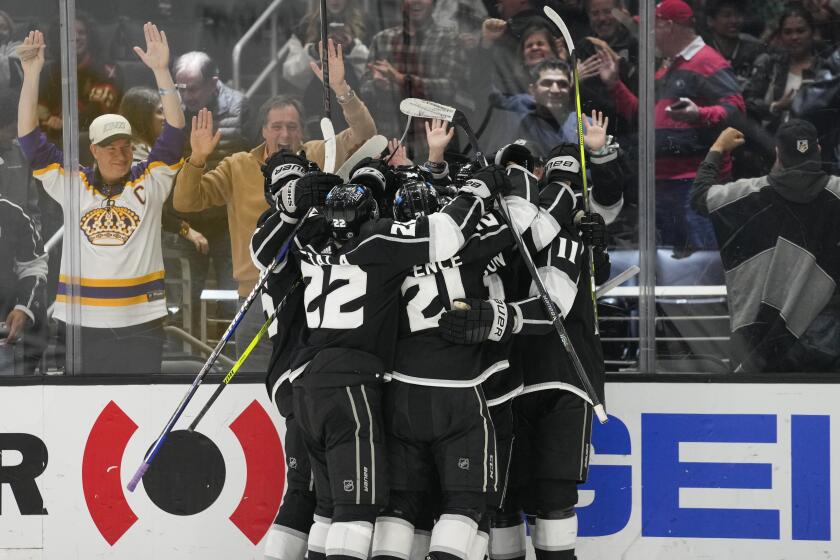Column: If rule changes like the international tiebreaker make MLB more exciting, they can’t be wrong
Heresy! Sacrilege!
The World Baseball Classic semifinal between Puerto Rico and the Netherlands, tied through 10 innings, was decided by the international tiebreaker.
The Netherlands started the top of the 11th inning with runners at first and second base. Puerto Rico batted in the bottom half of the inning in the same situation.
What in the name of Ty Cobb was this?
I’ll tell you: It was exciting, fun. And it was certainly better than sitting through more scoreless innings and waiting in sadistic anticipation for a position player to take the mound.
I’m in the minority here, but I loved it.
This is the kind of rule change that should receive serious consideration by Major League Baseball, which would like to appeal to more younger viewers.
The league’s focus has been on shortening the length of games, presumably to coincide with the shorter attention spans of the children we’re raising.
But reducing a game from 3½ hours to 3 hours 15 minutes won’t do anything.
This is about excitement and creating moments.
Say what you want about Puerto Rico’s walk-off win, but if you were an impartial viewer you can’t tell me you didn’t perk up in that 11th inning.
“I thought it was a great end to the ballgame,” MLB Commissioner Rob Manfred said. “I really did. It was very exciting.”
Mindful of the game’s traditionalists, Manfred wasn’t ready to push for the tiebreaker to be a part of MLB’s regular season. A variation of the rule is expected to be used this year in the low minor leagues.
Baseball has always cared for tradition, and rightfully so. No other American sports league places a greater premium on its links to the past.
The sport has sold a perpetuated myth that today’s game is the same one your grandfather watched decades ago.
All fiction.
The game has constantly evolved. Outfield walls were moved closer to home plate. The pitcher’s mound was raised, then lowered. Complete games by starting pitchers, once commonplace, are now rare. Advanced metrics are playing an increased role in decision making.
Recent rule changes were initially considered assaults on the sanctity of the game. The so-called Posey Rule to reduce collisions by outlawing catchers’ blocking home plate and the Utley Rule that banished the takeout slide at second base are two examples. Baseball survived them.
The international tiebreaker wouldn’t hurt baseball any more than the shootout hurt soccer or hockey.
In the playoffs, sure, let the two teams decide a winner the old-fashioned way. But, really, what is gained from extending a regular-season game in May?
The loss is the novelty of watching a position player take the mound, but that almost never happens. The last time a Dodgers position player pitched in a regular-season game was in 2014.
As it is, too many regular-season games are decided by bad players. Lineups are instructed to run up the opposing starter’s pitch count to run him out of the game, replaced by a presumably more vulnerable middle reliever. Many extra-inning games end with one of the team’s worst pitchers on the mound for multiple innings. What’s sacred about that?
Joe Torre, a longtime player and manager who is MLB’s chief baseball officer, is an advocate of the tiebreaker.
“I based it on sitting in the dugout all those years, watching all those extra-inning games that go into the 13th, 14th, 15th inning, and everybody is going to end it with a home run,” Torre told Los Angeles Times reporter Bill Shaikin. “It’s the ugliest game I have ever seen.”
Think of the upside. Fewer children going to sleep without knowing whether their team won. Not only that, their nights could be punctuated by a surge of excitement.
Baseball’s biggest problem is that it doesn’t show or inspire emotion, a byproduct of the unwritten rules of America’s version of the sport. While many baseball fans ignore the WBC as a glorified exhibition, there’s a reason others enjoy it.
Crowds feed off the passion displayed by the players and managers, particularly from the animated Latin and Caribbean teams. (MLB made a mistake when it enacted rules that essentially ended the longstanding tradition of managers storming the field to argue with umpires.)
If baseball can create more opportunities for emotions to be showcased without altering the fundamental nature of the game — say, by setting up a potential walk-off in the 11th inning — it should.
In interviews, several baseball people raised the importance of statistics in the sport and how the international tiebreaker would alter them.
Like the integrity of statistics hasn’t already been compromised by steroids? It’s the reason Barry Bonds’ career home run record isn’t nearly as revered as Hank Aaron’s mark was.
The Steroid Era placed a stain on the game. Engaging a rule that invites more excitement is the kind of change MLB should embrace.
Follow Dylan Hernandez on Twitter @dylanohernandez
More to Read
Get our high school sports newsletter
Prep Rally is devoted to the SoCal high school sports experience, bringing you scores, stories and a behind-the-scenes look at what makes prep sports so popular.
You may occasionally receive promotional content from the Los Angeles Times.







